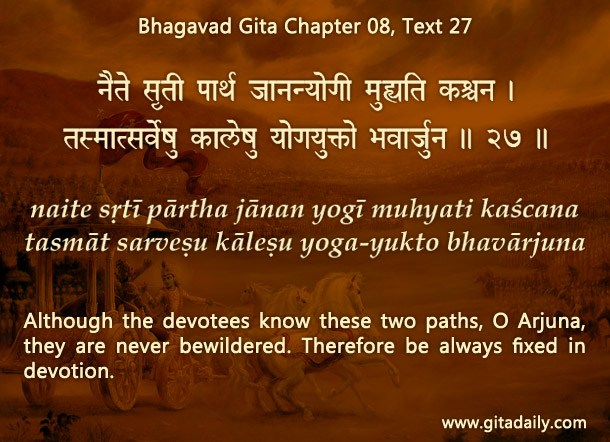In the Bhagavad-gita’s eight chapter, Krishna explains how dedicated yogis train themselves to depart at auspicious times, thereby attaining liberation (08.24). Those who depart at other times won’t be liberated (08.25).
Hearing this, Arjuna is understandably concerned. Timing one’s death so precisely requires a phenomenal level of self-mastery that seems tough even for committed yogis. What, then, to speak of Arjuna who is fighting on a battlefield against formidable enemies? Even if Arjuna survives and succeeds on the battlefield, he will then be encumbered by rigorous royal responsibilities. Will he ever have enough time for the immense, intense yoga practice necessary to determine the exact moment of one’s death?
Though Arjuna doesn’t voice these apprehensions, Krishna is close enough to him to sense his unspoken concerns. After all, Arjuna has already expressed reservations about the practicality of yoga (06.33-34). There, Krishna had assured him that success was possible by the appropriate process (06.36). Pointing to bhakti-yoga as the recommended process, he declared that the topmost yogis are those who faithfully remember him within their hearts (06.47).
Lest that recommendation be unclear, he contrasts the processes of dhyana-yoga and bhakti-yoga (08.07-14) and concludes that bhakti-yoga can easily grant perfection (08.14: sulabhah). Indeed, this is the only place in the entire Gita where Krishna deems any process easy.
Krishna reiterates his endorsement of bhakti while addressing Arjuna’s concern about untimely death; he urges Arjuna to fearlessly stay engaged in the recommended yoga practice (08.27). Lest there be any ambiguity about his recommended yoga practice, Krishna uses here the same line (tasmat sarveshu kaleshu: therefore, at all times) that he had used when explicitly endorsing bhakti-yoga as the best means to prepare for death: remember Krishna internally and fight for Krishna externally (08.07).
One-sentence summary:
Addressing Arjuna’s concern about untimely death, Krishna recommends bhakti-yoga, wherein success depends on what we remember lifelong, not when we die.
Think it over:
- Why does Krishna’s description of how yogis depart leave Arjuna concerned?
- How does Krishna address Arjuna’s sixth chapter concern?
- How does Krishna address Arjuna’s eight chapter concern?
***
08.27: Although the devotees know these two paths, O Arjuna, they are never bewildered. Therefore be always fixed in devotion.
To know more about this verse, please click on the image


Thank you prabhu for pointing to the similarity between 8.07 and 8.27. I was recently wondering how Krishna in 8.27 and 8.28 could possibly be referring to bhakti-yoga because He uses “yogi” throughout chapter 8. 8.07 pertains to bhakti-yoga, and now I see the textual commonality between 8.27 and 8.07.
Thanks for your thoughtful appreciation.